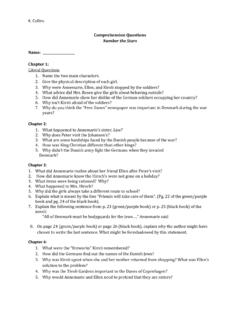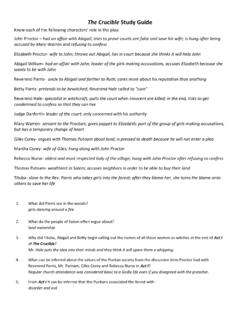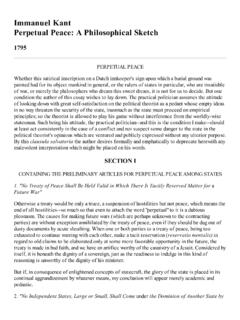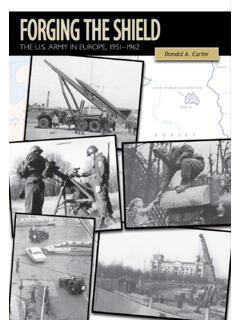Transcription of Causes and Effects of European Exploration: Causes-
1 Causes and Effects of European Exploration: Causes - European desire for new trade routes Growing power and wealth of European nations Competition for trade Missionaries' desire to convert others to ChristianityEffects- Knowledge grows about other religions European and Native Americans clash Enslavement of Africans Rivalry in The Americas History- Core Content: I can explain how conflict and competition occurred among individuals and groups in the United States prior to and during the Revolutionary War. I can explain and give examples of how the ideal of equality and personal liberty that developed during the colonial period contributed to the American Revolution.
2 The Middle Passage- The inhuman part of the triangular trade, shipping enslaIndies. (In the map, this would be routes 5 and 9.) English Bill of Rights- Guaranteed certain The Colonies provided England with raw materials. English manufacturers used these materials to produce finished goods which they sold to colonists. This is called The Great Awakening- is a religious revival. It was a return to a strong faith and happy Learning Assistant The inhuman part of the triangular trade, shipping enslaved Afric.
3 (In the map, this would be routes 5 and 9.) Guaranteed certain basic rights to all citizens. The Colonies provided England with raw materials. English manufacturers used these materials to produce finished goods which they sold to colonists. This is called Mercantilism. is a religious revival. It was a return to a strong faith and happy Africans to the West The Colonies provided England with raw materials. English manufacturers used these materials to is a religious revival. It was a return to a strong faith and happy days.
4 Events leading up to the Revolutionary War: The Proclamation of 1763- King George III declared that the Appalachian Mountains were the temporary western boundary for the colonies. This created friction. Why? 1. It allowed the British government, not the colonists to control the Westward Movement. 2. King George wanted to slow colonists, by making them move away from the colonies on the coast, where important British markets were. 3. Protects the interest of British officials. The British planned to keep 10,000 troops in America just to protect their interest.
5 The British needed money to pay for the French and Indian War. Sugar Act- Taxes on imported sugar and molasses Stamp Act- Tax on paper material Currency Act- Forbid colonists from printing money Quartering Act- Makes colonists give the English soldiers foods and shelter with no repayment Declatory Act- Parliament had the right to tax and make decisions for the British colonies Townshend Act- Taxes put on imported American goods Tea Act- The British East India Company sells tea to colonist Coercive Acts- Also known as the Intolerable Acts.
6 Were laws passed by King George, to control the colonists with very harsh punishments Quebec Act- Set up a permanent government for Quebec and granted religious freedom to French Catholics Chapter 1-4 Vocabulary- Archeology- the study of ancient peoples Artifacts- things left behind by early peoples Nomads- people who moved from place to place Migration- a movement of a large number of people into a new homeland Culture- a way of life (religion, food, language, housing, government, etc.) Civilizations- highly developed societies Hieroglyphics- use of symbols or pictures to represent things, ideas, and sounds Terraces- platforms cut into the slopes of mountains so they could raise crops Droughts- long periods of little rainfall Federations- governments that linked different groups Renaissance- a French word meaning rebirth.
7 It refers to he rebirth of interest in the classical Greek and Roman learning Caravel- a ship with three mast that sailed faster than earlier ships Pilgrimage- a journey to a holy place Circumnavigate- to sail around the world Conquistadors- Spanish explorers who came to the Americas looking for gold Missions- religious communities established by the Spanish Plantation- a large estate Mercantilism- economic theory that says a nation s power is based on its wealth. The colonies belong to the mother country. Columbian Exchange- brought together the continents of Europe, Asia, and Africa.
8 Contact led to an exchange of plants, animals, and diseases. Northwest Passage- a more direct water route through the Americas Charters- permission from the King to organize a settlement in the new world Joint-stock Company- investors bought stock or part ownership in a company in return for a share of the future profits Jamestown- first English settlement. Built on a peninsula in present day Virginia. The swampy land swarmed with mosquitoes that carried disease, lacked good farmland and drinking water. o John Smith- saved the colony by forcing settlers to work, explored the area and got food from the local natives.
9 O John Rolfe- learned to grow a type of tobacco (became the cash crop) o Pocahontas- daughter of the Indian chief, married John Rolfe Headright- grant of 50 acres to those who paid their wn way to the colonies Indentured Servants- they agreed to work without pay for a certain number of years (usually 7) in exchange for passage to the colonies Puritans- Protestants who wanted to reform the Anglican Church Separatists- These were Protestants who wanted to leave and set up their own churches Pilgrims- Separatist who left England for Virginia so they could practice their religion freely Mayflower Compact- before going ashore the Pilgrims drew up a formal document that pledged their loyalty to England and established rules to live by Persecuted- to be treated harshly Tribute- money paid for protection.
10 The Aztec forced conquered people to pay them with crops, clothing, gold, precious stones, and captives. Important People/ Explorers: Bartholomeu Dias- first to sail around the southern tip of Africa named it the Cape of Good Hope Vasco da Gama- first to sail to India Christopher Columbus- Thought her could get to India by sailing west instead of going east. Given credit for discovering the Americas but he really rediscovered the because the Vikings had explored and settled Vinland which historians now believe to be North America Ferinand Magellan- lead the first expedition to circumnavigate, or sail around the world Hernan Cortes- Spanish conquistador who conquered the Aztecs in Mexico with only 300 soldiers Montezuma- Aztec ruler when Cortes arrived Francisco Pizarro- Spanish conquistador who conquered the Incas in Peru in South America.












